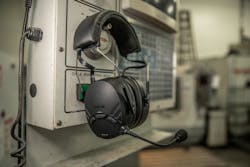In the midst of COVID-19, manufacturers are getting creative about how to work in the factory while social distancing. Take General Mills, which turned to technology originally developed for the motorcycle community to solve a training problem in its plants.
When it’s time to get operators up to speed on a new machine, the food manufacturer usually flies an expert out to the facility to conduct onsite instruction with a group. That protocol has stopped due to the pandemic, and instead, General Mills had been trying to train operators via Skype on tablets—which has limitations. For example, one person may be able to plug earphones in to the tablet to hear the directions, but that doesn’t help the other dozen or so folks trying to listen in to learn.
Here’s where folks are getting creative. Someone on the General Mills team rides motorcycles and uses gear from Sena Technologies, a provider of helmets that are equipped with Bluetooth and mesh network technology to allow any number of riders to communicate within a certain range. Not surprisingly, this same set up—using a headset instead of a helmet—can work on the factory floor.
Sena Technologies is a privately-held company started by a couple of programmers who were writing Bluetooth code in the 1990s, and who also happened to be motorcycle enthusiasts. They took their knowledge of the wireless technology and figured out how to amplify the signal to communicate from motorcycle-to-motorcycle. Fast-forward a few decades, and the technology, which had been perfected with millions of units on the roads, was gaining interest in other outdoor industries, as well as the industrial sector.
The Sena Tufftalk M headset comes in two styles: over-the-head earmuffs and hard hat integrated, both offering a hands-free intercom system and a three-button layout for easy control.
Each headset has a data register which acts as a node on a network. The registers are updated every second, so the system knows where they all are, enabling the mesh network to find the best way to communicate with each person, as well as self-heal when the person or “node” is out of the network—or comes back in.
An unlimited amount of people can be communicating, and private groups can be set up to chat on one of the nine different channels available. “Some facilities set up channel 9 as an emergency channel, so if anything goes wrong they can get quick information,” said Chris Clarke, Sena’s director of global sales.
And at $500 per headset, it’s affordable. “The standard response we get is that this is half the price of normal headsets in these factory settings,” Clarke said, noting that the company uses the same chipset for every industry, from motorcycle helmets to arborist applications, resulting in a nice economy of scale.
Tufftalk M has been a quick and affordable solution for manufacturers like General Mills that are trying to navigate COVID-19 work policies. But there are other use cases for the headset emerging.
The headset can be paired with a phone to take calls. An FM radio can be built-in, and when someone comes in to talk the radio goes down. In addition, Tufftalk M can connect with any PLC that has a Bluetooth module, which is an efficient way to communicate machine status.
“With our technology we can talk to that PLC, which can send audio signals to anyone on the mesh network and say, ‘the feeder bowl on 23 is empty,’ for example,” Clarke said. And, it’s secure, as Bluetooth requires permission to pair a device. “It’s not like someone could sit outside the factory and mess with [the PLC] via Bluetooth. It literally has to be someone from within the factory to say you are approved and have permission.”
Whether it’s distance learning via Skype or social distancing with other operators on a noisy production line, Tufftalk M is changing the way people communicate on the plant floor.
For more on mesh networking technology:
Leaders relevant to this article:

